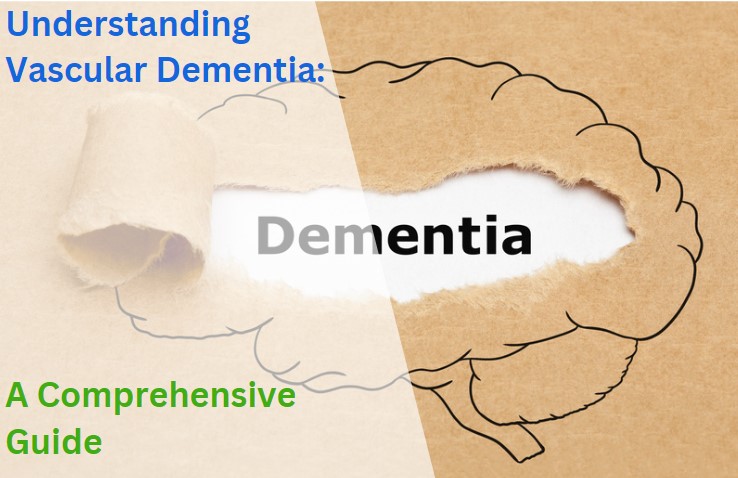
UNDERSTANDING VASCULAR DEMENTIA: A COMPREHENSIVE GUIDE
Vascular dementia is the second most common type of dementia after Alzheimer’s disease, affecting millions of people worldwide. It arises from problems with the blood supply to the brain, which can lead to cognitive decline and other symptoms. Understanding this condition is crucial for effective management and support. In this blog, we’ll delve into what vascular dementia is, its causes, symptoms, and how it can be managed.
What is Vascular Dementia?
Vascular dementia is a type of cognitive impairment caused by reduced blood flow to the brain, which leads to damage of brain cells. Unlike Alzheimer’s disease, which primarily involves the buildup of amyloid plaques and tau tangles in the brain, vascular dementia results from vascular issues, such as stroke or small vessel disease. This reduction in blood flow disrupts the brain’s ability to function normally, leading to a gradual decline in cognitive abilities.
Causes and Risk Factors
Vascular dementia can result from various problems, including stroke(s), small vessel disease and transient Ischemic Attacks (TIAs). A leading cause of vascular dementia is a single large stroke or multiple smaller strokes. Strokes occur when the blood flow to a part of the brain is blocked or reduced. Strokes causes damage to brain cells and lead to cognitive decline. Transient Ischemic Attacks (TIAs), sometimes called “mini strokes”, are temporary blockages of blood flow to the brain that can cause brief episodes of cognitive impairment. Multiple TIAs can increase the risk of developing vascular dementia.
Small vessel disease is a disease that involves damage to the small blood vessels in the brain. This disease is often due to chronic conditions like hypertension or diabetes. The gradual accumulation of damage from these small vessels can impair cognitive function.
Similar to other disease and conditions, there are key risk factors that increase the probability of being diagnosed with vascular dementia. These factors include:
- Age: The risk increases with age, particularly after 65.
- High Blood Pressure: Chronic hypertension can damage blood vessels and contribute to vascular dementia.
- Diabetes: Diabetes can lead to vascular damage, increasing the risk of dementia.
- Heart Disease: Conditions such as atrial fibrillation can lead to blood clots, which may cause strokes and contribute to vascular dementia.
- Smoking and Excessive Alcohol Use: These habits can negatively impact your brain health and increase dementia risk.
Symptoms
The symptoms of vascular dementia can vary depending on the extent and location of the brain damage. Common symptoms include:
- Memory Problems: Difficulties with short-term memory and learning new information.
- Cognitive Decline: Challenges with reasoning, planning, and problem-solving.
- Confusion and Disorientation: Difficulty understanding time and place.
- Difficulty with Daily Activities: Problems with organizing tasks or managing personal finances.
- Mood Changes: Changes in mood or behavior, such as increased irritability or depression.
- Gait and Balance Issues: Problems with walking or maintaining balance.
Unlike Alzheimer’s disease, the progression of vascular dementia can be stepwise, with sudden declines in cognitive function following strokes or other events that restrict blood flow to the brain.
Diagnosis and Treatment
Diagnosing vascular dementia involves a combination of medical history, physical examination, cognitive assessments, and imaging studies. Brain imaging techniques such as MRI or CT scans can help identify areas of damage caused by strokes or small vessel disease.
while there is currently no cure, there are treatments that focus on managing symptoms and improving quality of life. Key approaches include:
- Managing Underlying Conditions: Controlling risk factors such as high blood pressure, diabetes, and heart disease is crucial. Medications and lifestyle changes can help manage these conditions.
- Medications: Certain medications may be prescribed to help manage symptoms or improve blood flow to the brain. However, these treatments are primarily aimed at symptom management rather than reversing the condition.
- Cognitive and Behavioral Therapies: Engaging in cognitive therapies and behavioral interventions can help improve cognitive function and quality of life.
- Supportive Care: Support from healthcare professionals, family, and caregivers can play a significant role in managing daily challenges and providing emotional support.
Prevention and Lifestyle Changes
While it may not be possible to prevent vascular dementia entirely, making lifestyle changes can reduce your risk. Key strategies include:
- Healthy Diet: Eat a balanced diet rich in fruits, vegetables, whole grains, and lean proteins. Limit saturated fats, salt, and sugar.
- Regular Exercise: Engage in physical activity to promote cardiovascular health and support cognitive function.
- Quit Smoking: Avoid smoking, as it can damage blood vessels and increase dementia risk.
- Limit Alcohol: Consume alcohol in moderation to reduce its impact on brain health.
- Regular Health Check-ups: Monitor and manage chronic conditions like high blood pressure and diabetes.
Conclusion
Vascular dementia is a serious condition that affects many individuals, but understanding it can empower patients and caregivers to seek appropriate treatment and support. By managing risk factors, adhering to medical advice, and making healthy lifestyle choices, it is possible to improve quality of life and slow the progression of the disease. If you or a loved one are experiencing symptoms of vascular dementia, consult with a healthcare provider to explore diagnosis and management options. With the right approach, it’s possible to navigate the challenges of vascular dementia and maintain a fulfilling life. Contact My Place Home Care to find out how we can help you today!

